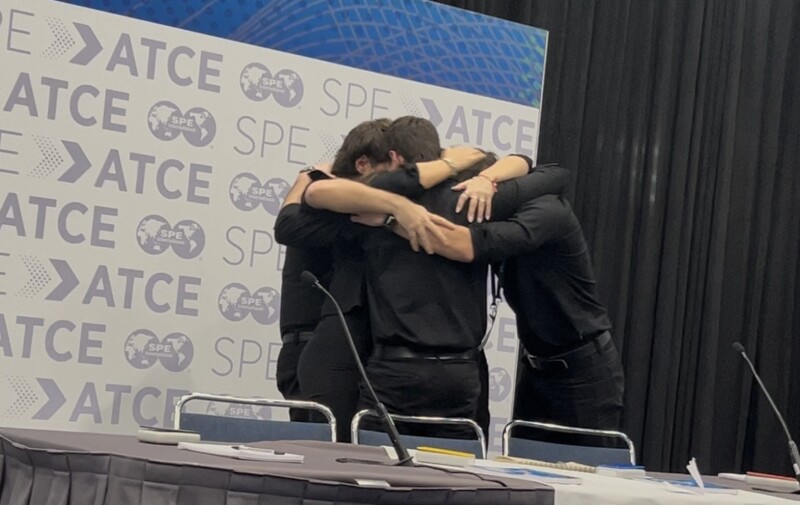On 20 October 2025, we became the first team from the University of Buenos Aires (UBA)—and from Argentina—to win the SPE PetroBowl World Championship. For the first time in history, our public university stood at the top of a competition traditionally dominated by North American institutions. What began as a small student-led initiative has become a national milestone for academic excellence, teamwork, and resilience.

Our team comprised Catalina Daniela Montes (captain, since 2024), Stefano Saitta, Luis Santiago Rolandelli, Nadine Sofía Dinoto, and Demian Leonardo Radio. Together, we represented a young petroleum engineering program that had only begun in 2016 and has produced just 10 graduates so far.
Building a Team Without a Legacy
The SPE UBA Student Chapter was founded in 2018. Three years later, in 2021, the university formed its first PetroBowl team with almost no materials, 1 month to prepare, and no track record. We placed third in Argentina; not enough to qualify, but enough to spark ambition.
In 2023, we attempted to qualify regionally but did not advance. In 2024, everything changed—we qualified internationally for the first time and finished in the top eight worldwide. That achievement convinced us that our university could compete at the highest level.
2025: A Turning Point
Our transformation accelerated when YPF, Argentina’s national oil company, noticed our effort and fully sponsored our preparation. We were offered internships in our preferred technical areas, which allowed us to apply academic knowledge in professional settings: from drilling and completions to reservoir and real-time operations.
Understanding that PetroBowl requires English proficiency at a competitive level, we received language coaching led by technical English head coordinator, Adrián Kapacevich, and English coach, Laura Kuperman. Their guidance helped us speak confidently, articulate appeals to judges, and engage with international teams. For a Spanish-speaking team, this support was crucial.
Strategy Development
This support allowed us to prepare with structure and discipline. We realized that PetroBowl goes beyond standard data sets—it’s about understanding. Instead of trying to memorize answers, we focused on mastering concepts and trusting our reasoning during high-pressure moments.
That mentality proved essential. It helped us answer “out of data set” questions, confidently appeal decisions, and maintain composure in front of judges.
Community and Mentorship
The competition is not only about knowledge: it is about people. We organized friendly matches with teams from different countries weeks before the championship. These sessions were opportunities to share knowledge, simulate competition pressure, and form friendships with future industry professionals.
Professionals also played a big role in our journey—professors, engineers, former competitors, and English language coaches all supported us. Their guidance went beyond PetroBowl topics and helped shape our perspective on the energy industry—field operations in Vaca Muerta, well completions, energy transition policies, digital oil fields, and reservoir simulation workflows.
World Championship Match by Match
Our path to the title included some of the most competitive institutions in the world.
| Round | Opponent | Key Detail |
| First Match | Universiti Teknologi PETRONAS | Complex round with multiple appeals. |
| Group Stage | Kazakh-British Technical University | Decisive to advance |
| Round of 16 | Federal University of Petroleum Resources (FUPRE) | 2024 semifinalists |
| Quarterfinal | IFP School (France) | Europe’s regional champion |
| Final | Universidade Federal do Rio de Janeiro (UFRJ) | Former world champion |
The final against Universidade Federal do Rio de Janeiro (UFRJ) was symbolic—a match between two South American teams, showing the region’s academic growth and potential.

The Way Ahead: Legacy and Responsibility
Winning did not mark the end; it marked the beginning of new responsibilities. Our first goal is continuity. UBA has now established structured recruitment for future teams, allowing students to begin preparations months earlier.
PetroBowl demands sacrifice, dedication, and passion. It is not for those who only want recognition, but for those who genuinely care about learning. It turns a group of students into a community of people who share purpose and curiosity.
We also believe that former competitors should participate in discussions about improving the competition format. PetroBowl must remain fair, updated, challenging, and enjoyable.
Impact and Visibility
Our victory resonated across Argentina. National media—television, radio, podcasts, and newspapers—shared our story. Many citizens, for the first time, learned that petroleum engineering is a degree offered at public universities. It gave visibility not only to us but to thousands of students who aspire to contribute to Argentina's energy future.

On a personal level, this experience strengthened our technical expertise and soft skills: problem-solving under pressure, teamwork, leadership, English fluency, and resilience. Today, we continue applying those skills in our internships at YPF and academic roles within the university.
Conclusion
This championship was our first major achievement as future engineers. Beyond knowledge, we built something greater: resilience, friendship, trust, and a belief that students from public universities in Latin America can reach global podiums. Our next goal is to mentor new teams, contribute to the evolution of PetroBowl, and continue representing Argentina on the international stage.
PetroBowl is more than a competition—it is a bridge between students and the global energy industry. We hope more countries, companies, and universities will invest in young talent, because this is where the future begins.
Acknowledgements
The team extends heartfelt thanks to:
- The founding members of the UBA PetroBowl Team
- Professor Guillermo Frati for his early guidance.
- Coaches from D&M, Juan and Paul
- English professors at YPF, Adrian and Laura


